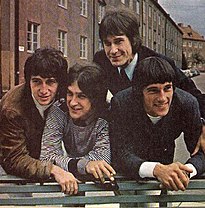Kinks
| The Kinks | |
|---|---|

Original line-up in 1965. From left: Pete Quaife, Dave Davies, Ray Davies, Mick Avory.
|
|
| Background information | |
| Origin | Muswell Hill, London, England |
| Genres | Rock, pop |
| Years active | 1964–1996 |
| Labels | Pye, Cameo, Reprise, RCA, Arista, London, MCA, Columbia, Koch, Guardian, Universal |
| Associated acts | Nicky Hopkins, the Mike Cotton Sound, Argent, the Creation, the Kast Off Kinks |
| Website | thekinks.info |
| Past members |
Ray Davies Dave Davies Mick Avory Pete Quaife John Dalton John Gosling Andy Pyle Gordon John Edwards Jim Rodford Ian Gibbons Bob Henrit Mark Haley |
The Kinks were an English rock band formed in Muswell Hill, North London, in 1964 by brothers Ray and Dave Davies. They are regarded as one of the most important and influential rock bands of the era. The band emerged during the height of British rhythm and blues and Merseybeat, and were briefly part of the British Invasion of the US until their touring ban in 1965. Their third single, the Ray Davies-penned "You Really Got Me", became an international hit, topping the charts in the United Kingdom and reaching the Top 10 in the United States. Between the mid-1960s and early 1970s, the group released a string of hit singles; studio albums drew good reviews but sold less than compilations of their singles. Their music was influenced by a wide range of genres, including rhythm and blues, British music hall, folk and country. They gained a reputation for reflecting English culture and lifestyle, fuelled by Ray Davies' observational writing style. Albums such as Something Else (1967), The Kinks Are the Village Green Preservation Society (1968), Arthur (1969), Lola Versus Powerman (1970), along with their accompanying singles, are considered among the most influential recordings of the period.
After a fallow period in the mid-1970s, the band experienced a revival during the late 1970s and early 1980s with albums Sleepwalker, Misfits, Low Budget, Give the People What They Want and State of Confusion. In addition, groups such as Van Halen, the Jam, the Knack, the Pretenders and the Fall covered their songs, helping to boost the Kinks' record sales. In the 1990s, Britpop acts such as Blur and Oasis cited the band as a major influence. The Kinks broke up in 1996, a result of the commercial failures of their last few albums and creative tension between the Davies brothers. Ray Davies (lead vocals, rhythm guitar) and Dave Davies (lead guitar, vocals) remained members throughout the group's 32-year run. Longest-serving member Mick Avory (drums and percussion) was replaced by Bob Henrit, formerly of Argent, in 1984. Original bassist Pete Quaife was replaced by John Dalton in 1969, and Dalton was in turn replaced by Jim Rodford in 1978. Session keyboardist Nicky Hopkins accompanied the band in the studio for many of their recordings in the mid-to-late 1960s. In 1969 the band became an official five-piece when keyboardist John Gosling joined them, being replaced by Ian Gibbons in 1979, who remained in the band until they broke up in 1996.
...
Wikipedia
